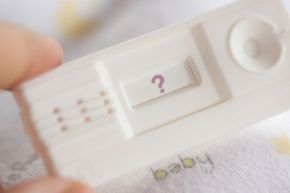More than 4 million babies are born in the U.S. every year, and if you're hoping to conceive, sometimes it may seem as if everyone you know is expecting [source: CNN]. Everyone except you. An estimated 2 million married couples in the U.S. are infertile, and an estimated 7.3 million women of reproductive age (ages 15 to 44) have used fertility services [sources: American Pregnancy Association; Centers for Disease Control and Prevention]. If you haven't conceived after a year of trying (or six months if you're 35 or older), and you're considering fertility testing, you should know that some basic tests can now be done at home, similar to at-home pregnancy tests.
Currently, American women are able to test at home for pregnancy, ovulation and fertility. While pregnancy tests look at urine levels of hCG (human chorionic gonadotropin), and ovulation tests measure LH (luteinizing hormone), fertility tests measure the level of FSH (follicle-stimulating hormone). Produced by the pituitary gland, this hormone is responsible for producing a fully developed egg each month.
Advertisement
Just as with any at-home, urine-based test kit, you should be sure to follow the fertility test's instructions closely: FSH must be tested on day 3 of a woman's cycle to get an accurate reading of how much FSH her body must produce to develop a quality egg. Chances of becoming pregnant and having a healthy pregnancy are low without a viable egg.
During each cycle, a woman's body will try to develop a mature, healthy egg. As a woman ages, or due to problems such as autoimmune disorders (especially pituitary gland disorders), genetics, medications, some cancer treatments or environmental factors, her FSH levels begin to rise. Why? Because even though a woman is born with more eggs than she'll need in a lifetime -- roughly 1 to 2 million eggs -- the number of usable eggs, known as her ovarian reserve, begins to diminish as she ages [source: Merck Manuals]. When this happens, her body makes more FSH in an attempt to develop viable eggs. High FSH results on an at-home test indicate there's some level of fertility impairment, but not the cause. For additional testing, seek the advice of your doctor or fertility specialist.
Because infertility affects men just as it affects women, at-home tests are also available for men. In fact, it's estimated that at least 20 to 30 percent of couples who have trouble conceiving do so because of a male fertility problem [source: WebMD]. Let's look at how men are now able to test their fertility at home.
Advertisement
